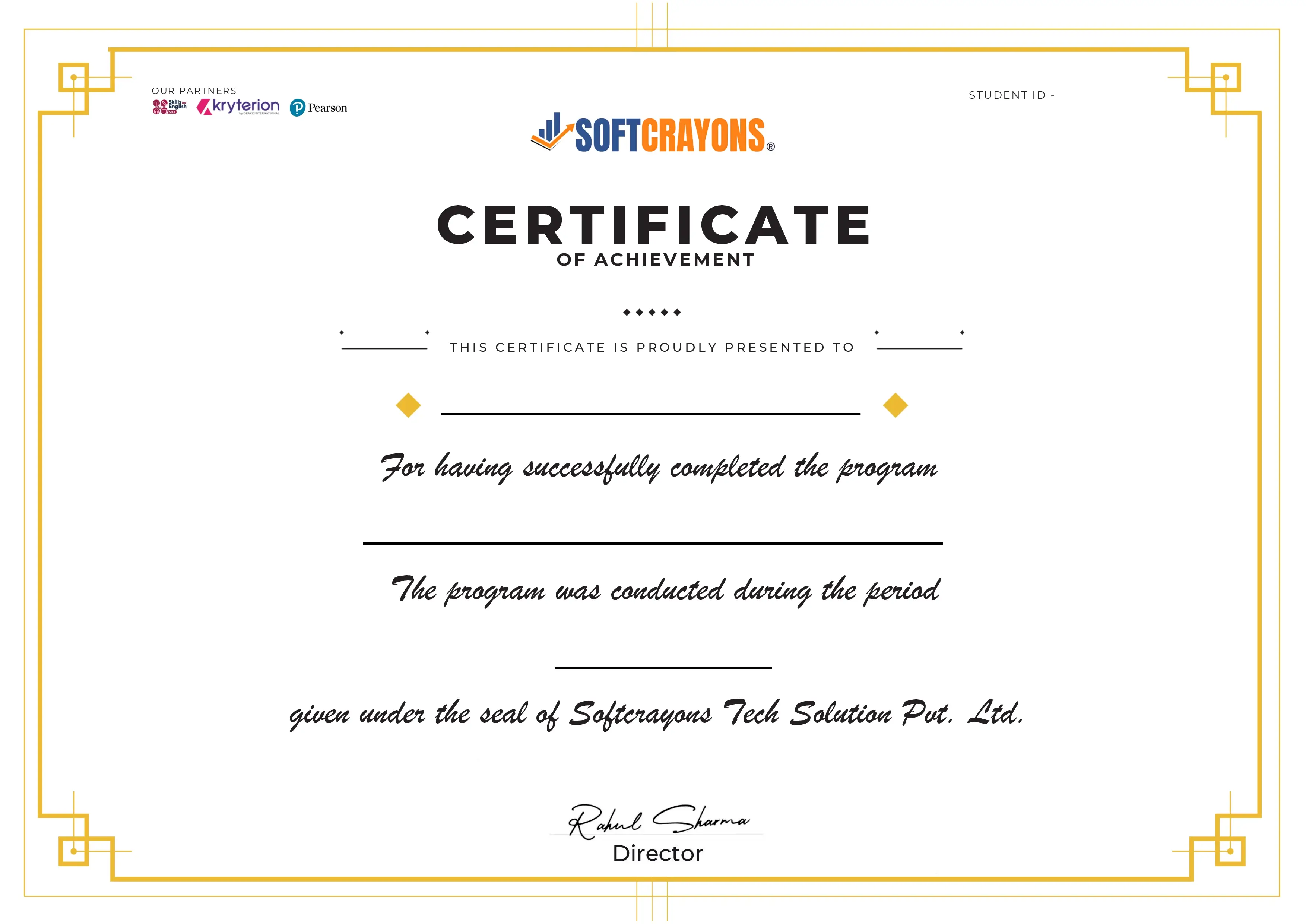SQL Sever Training
"Innovate. Integrate. Inspire The Future with SoftCrayons"
SQL Server Training
Have you explored the many things SQL Server Training in Ghaziabad can accomplish? People are stuck with the most vulnerable jobs in reputed industries.
But it would be best to attain the prospect that will allow you to gain the level in your career.
So check out more about one of the best IT Training Courses in Ghaziabad that allow exposure and experience in a tech-savvy world.
Start making it more approaching from the basics of SQL Server Course Training…
SQL, or Structured Query Language, allows users to connect and manipulate databases.
It can also extract data from databases, perform queries against a database, and create content for existing databases, like records, tables, or views.
SQL is among the most used programming languages that exist. It is utilized in many different fields like:
Learn, Build Skills, Grow Limitlessly. Your IT Career Starts Here.

Course Duration
2 - 3 Months

New Batch
As per schedule hybrid mode

Payment
Flexible One-Time/Installment

Mode
Flexible Offline/Online
Professional Skill Development
Service Details
SQL Server Training
Have you explored the many things SQL Server Training in Ghaziabad can accomplish? People are stuck with the most vulnerable jobs in reputed industries.
But it would be best to attain the prospect that will allow you to gain the level in your career.
So check out more about one of the best IT Training Courses in Ghaziabad that allow exposure and experience in a tech-savvy world.
Start making it more approaching from the basics of SQL Server Course Training…
SQL, or Structured Query Language, allows users to connect and manipulate databases.
It can also extract data from databases, perform queries against a database, and create content for existing databases, like records, tables, or views.
SQL is among the most used programming languages that exist. It is utilized in many different fields like:
- Business Analytics
- Data Science
- Engineering software
- Administration of databases
- Journalism
Databases Training Course Ghaziabad is vital in business operations across all areas. SQL is a language that allows users to communicate with databases and is used by numerous organizations, such as Netflix, Uber, Amazon, Wells Fargo, and Google.
It is considered one of the easiest, most robust, and most user-friendly programming languages.
Due to the way that SQL is throughout the professional world, knowing SQL can open doors to many job opportunities and upward mobility.
In this article, you'll discover more about the different jobs that can benefit from SQL and how it can help your professional career.
No matter your goals, studying SQL is a practical and valuable ability to include on your resume.
What Can You Do with SQL Server Course Training?
For anyone who is working in the field of data, SQL expertise is a necessity. Various disciplines and fields use the language to connect to relational databases.
SQL Server Course Training is versatile and designed to let you utilize statements made using English to query databases in various ways.
Since it is the most commonly used database language, virtually every company that must store data in relational databases depends on it, including large corporations like Amazon, Google, and Uber.
Furthermore, websites like Facebook utilize SQL Server to store back-end information and process data.
SQL Server provides a broad range of built-in functions beneficial for data analytics:
- SQL COUNT is a way to count the number of rows in the table.
- SQL MAX delivers a way to determine the most valuable value for a column.
- SQL MIN lets users choose the minimal value for an individual column.
- SQL SUM totals the values in the queue.
- SQL AVG can calculate the average of columns within tables.
Additionally, SQL Server has other practical applications to handle large amounts of data:
- It could add, modify or delete records in the database.
- SQL can be used to create databases.
- SQL users can create new tables for existing databases.
- SQL can create views and stored procedures within a database.
- It allows permissions to be granted to views, tables, and policies.
Professional Uses for SQL Server Training Courses Ghaziabad
SQL Server is utilized in a wide range of professions and industries. SQL remains a top choice for software because numerous relational database management systems employ this language.
SQL Server Course Certification provides versatility and adaptability that can be used for a wide selection of professional software.
These are only a few of the numerous professions that utilize SQL Server Courses:
SEO Analysts
SEO Analysts who analyze data and modify website content to boost search engine traffic use SQL Server to assist them in navigating enormous amounts of information.
Database Administrators
Database Administrators ensure that the database software within their company efficiently organizes and stores data so employees can easily access it. They typically oversee the development teams.
Database Administrators also help enhance queries, manage backups and audits, and maintain Database Training Certification safe and available.
Software Engineers
Software Engineers use a variety of programming languages to create applications and computer system software. It is expected that Software Engineers work with SQL.
Data Scientists
Data Scientists frequently perform analytics on data, which makes SQL skills essential for analyzing and extracting Big Data to solve problems.
Business Analysts
Business Analysts often utilize SQL to aid them in locating the information that is stored in relational databases.
Journalists
Journalists with SQL expertise can quickly analyze, categorize, and sort through vast quantities of information, a procedure that would take much longer to accomplish manually.
Necessary Yet Effective SQL Server Training Program
The majority of programming languages are utilized exclusively for programming. Yet, SQL is unique because it is a tool that goes beyond programming in the traditional sense.
- People in sales groups or the marketing field utilize SQL to perform queries against datasets.
- This aids them in identifying trends in sales and monitoring the effectiveness of different marketing campaigns.
- Additionally, SQL has applications in the financial industry. Financial analysts use SQL to save time sorting through vast amounts of financial information.
SQL Servers Training Can Help You To Handle Massive Amounts Of Structured Data.
Data is critical in the modern workplace, and businesses produce more than ever. But, data must be efficiently stored and controlled for it to be valuable.
- With this massive amount of data, it is necessary to manage it to gain valuable insight efficiently.
- It's practical to analyse information manually when dealing with databases with thousands of records.
- This is the point where SQL queries are helpful. SQL programmers can efficiently perform various tasks like finding rows in massive datasets with filter criteria and multiple forms of data manipulation.
Aid In Structuring Information
For those who do not want to become Data Analysts and aren't interested in becoming one, learning SQL Server Training Course in Ghaziabad can allow you to understand better how a company organizes its data.
- It also offers insight into the benefits that can be gained from mixing different data sources.
- While SQL's structure may be relatively simple compared to the other language programming options, it's a highly effective tool for performing complicated queries.
- People trained to create these queries can get a larger quantity of helpful information, which is organized if it is beneficial to solve business issues.
- The employees who have SQL Server Course Training can also reduce the time their employers spend communicating with the tech team or Data Analysts.
The more knowledge they possess of the structure of their databases and the logic that drives SQL queries. The shorter time it will take them to find the required data extracts.
High Demand SQL Server Training Courses in Ghaziabad
Knowing SQL is an essential ability in a variety of sectors. Numerous jobs that depend on SQL to retrieve data are as follows:
- Designers
- Business Analysts
- Product Management
Since SQL Server Course Certification is robust and straightforward to master, some sites for jobs believe that it is the most sought-after skill an employee should possess.
Many job ads in financial and technical fields mention SQL skills as a requirement for all candidates.
Whatever the industry, SQL makes managing structured data much more accessible and assists in handling client-server transactions.
How does SQL Server work?
SQL Server works by storing and retrieving information in tables. Each table contains rows and columns. Rows represent individual pieces of news, while columns define what type of information each row contains.
When we want to retrieve data from a table, we issue a query specifying the columns we want to be returned along with any filtering conditions.
In addition to being able to search and filter data, SQL Server can aggregate and summarize the results of these queries.
Why Is SQL Server Training Course Ghaziabad A Good Skill For IT Professionals?
Databases Training Certification have become an increasingly popular tool for organizations looking to streamline their operations.
SQL Server is the world's most widely used database platform today, supporting over 250 million users across the globe.
Companies use databases to automate processes, store customer records, manage inventory, track employee performance, and perform analytics, among many other things.
Strong knowledge of the Best SQL Server Course enables IT professionals to build robust solutions for business-critical purposes.
Learn SQL Server Course Training with an Expert Instructor in Softcrayons
When learning SQL Server Training to be a professional, most people opt for instructor-led classes, which offer personal assistance and instant feedback on their programming.
If you're interested in learning about the fundamentals of SQL or getting more in-depth instruction, Softcrayons has multiple course options in Database Training Courses in Ghaziabad.
Softcrayons, the Best IT Training Institute in Ghaziabad, is designed to help students understand the language's basics.
Through this instructor-led, one-day course, students will build the foundation of SQL by studying rows, tables, columns, and the basics of filtering.
After the procedure is completed, students will have a thorough knowledge of the database's structure and be able to compose basic SQL query queries for Microsoft SQL Server.
If you're interested in learning the latest SQL principles, Softcrayons offers training sessions with expert instructors. Students interested in the course can also learn more about SQL through Softcrayons resources for learning.
Join Softcrayons Today To Boost Your Career Now…
Training Features
Live Interactive Classes
Real-time doubt clearing with expert instructors
Hands-on Projects
Build portfolio with industry-standard projects
Industry Curriculum
Updated syllabus matching current job requirements
Latest Technologies
Learn cutting-edge tools and frameworks
Online & Offline
Flexible learning modes to suit your schedule
Certification Support
Prepare for global IT certifications
LEARNING PATH
Master the Syllabus
Program Highlights

Top Faculty with Certification Facility
Learn from the best, as we impart world-class education with faculty who have rich academic & industry experience

Career Service: Job Readiness
Pursuing your desire to being job-ready through resume building sessions & MasterClass for interview preparation

Choose the way you want to learn
Enhance your learning potential by your choice of printed books, audio books, e-books, videos, and live classrooms

Placement Guarantee
Benefit from our network of over 500+ hiring partners from diverse domains to ensure a smooth job transition after 1 year
Common Questions
Upon successful completion of the program, your certificate will be emailed to you in a digital format. You can also download it from your Softcrayons account.
This advanced certificate course in cloud computing provides you with in-depth knowledge and hands-on experience in cloud technologies, preparing you for high-demand roles in the industry.
If you miss a lecture, you can access the recorded session on the Softcrayons platform. Additionally, you can reach out to our support team for further assistance.
This training prepares you for various cloud certification exams, such as AWS Certified Solutions Architect, Microsoft Azure Fundamentals, and Google Cloud Professional certifications.
We offer a 7-day money-back guarantee. If you're not satisfied with the program, you can request a refund within 7 days of enrollment, subject to our terms and conditions.
Yes, Softcrayons offers a batch deferral policy. You can defer your batch to a later date if you're unable to attend the current session, subject to availability.
Join Our SQL Sever Training
Guranteed Job Placement Program
- Expert-led training
- Hands-on projects
- Globally recognized certification
Training Certification
🎓 Earn Your Certificate
Successfully complete the training and assessments to receive your official certification. This credential validates your skills and enhances your career opportunities.
Showcase your achievements and share your milestones with your network to inspire others and grow your professional connections.

Interested in this Program? Secure your spot now!
Upcoming Batches
Program Induction
Program Induction
Interested in this Program? Secure your spot now!
What People Say About Us
Himanshu Tyagi
I have completed the course in 3-4 months of DIGITAL MARKETING training under the guidance of Experts Trainers. It was the best experience to learn under them and their teaching methods are out of the box. Best institute for professional courses and a great place. and very cooperative company with helpful staff.
Related Courses


